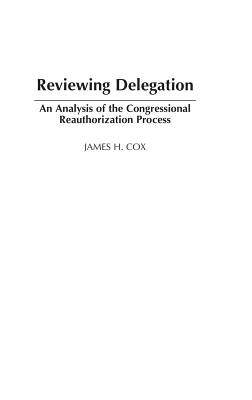
- We will send in 10–14 business days.
- Author: James H Cox
- Publisher: Praeger
- Year: 2004
- ISBN-10: 0275978524
- ISBN-13: 9780275978525
- Format: 15.4 x 24.4 x 1.8 cm, kieti viršeliai
- Language: English
- SAVE -10% with code: EXTRA
Reviews
Description
Members of Congress often delegate power to bureaucratic experts, but they fear losing permanent control of the policy. One way Congress has dealt with this problem is to require reauthorization of the program or policy. Cox argues that Congress uses this power selectively, and is more likely to require reauthorization when policy is complex or they do not trust the executive branch. By contrast, reauthorization is less likely to be required when there are large disagreements about policy within Congress. In the process, Cox shows that committees are important independent actors in the legislative process, and that committees with homogenous policy preferences may have an advantage in getting their bills through Congress.
EXTRA 10 % discount with code: EXTRA
The promotion ends in 21d.15:34:22
The discount code is valid when purchasing from 10 €. Discounts do not stack.
- Author: James H Cox
- Publisher: Praeger
- Year: 2004
- ISBN-10: 0275978524
- ISBN-13: 9780275978525
- Format: 15.4 x 24.4 x 1.8 cm, kieti viršeliai
- Language: English English
Members of Congress often delegate power to bureaucratic experts, but they fear losing permanent control of the policy. One way Congress has dealt with this problem is to require reauthorization of the program or policy. Cox argues that Congress uses this power selectively, and is more likely to require reauthorization when policy is complex or they do not trust the executive branch. By contrast, reauthorization is less likely to be required when there are large disagreements about policy within Congress. In the process, Cox shows that committees are important independent actors in the legislative process, and that committees with homogenous policy preferences may have an advantage in getting their bills through Congress.


Reviews